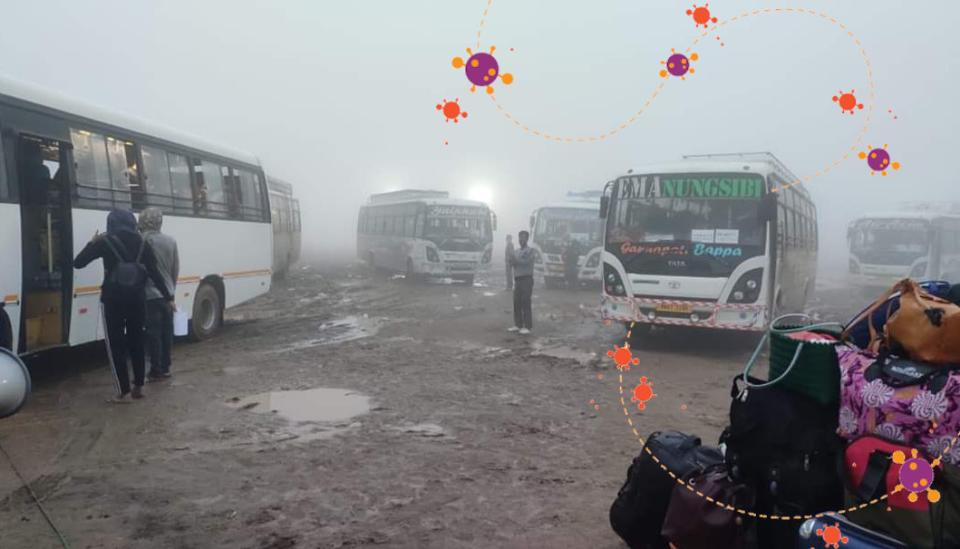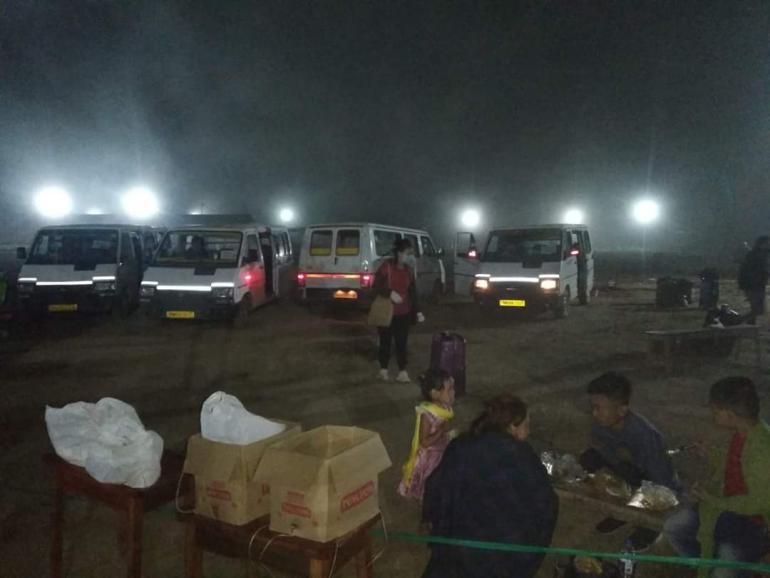
Image description: Returnees at bus stand in Manipur. Photo credit: Tennoson Pheiray
The general populace was unprepared and could not foresee what would be the effect of COVID-19 pandemic. In India, lockdown began on March 25. Public places, institutions, offices, markets, and services were shut. As the number of COVID-19 positive cases began to rise, the initial first phase of lockdown for twenty-one days was extended for nineteen days and again for fourteen days. It then went on with partial easing with certain conditions.
The pandemic and the lockdown has cause severe impact not only on health but on the livelihood of people across India. The situation was hard to endure for many, particularly for the majority of people who are collectively and loosely called "migrant workers".
People from the northeast states of India, who are studying or working in different cities too were hard hit. A study was done by Centre for North East Study and Policy Research, Jamia Millia Islamia Delhi in 2013, found that about 200,000 youths from the northeast states reside in Delhi alone, while it is roughly estimated that over 414,850 have migrated out of their states into various metro cities during 2005-2010. The northeast states includes, Arunachal Pradesh, Assam, Manipur, Meghalaya, Mizoram, Nagaland, Tripura.
A study was done by Centre for North East Study and Policy Research, Jamia Millia Islamia Delhi in 2013, found that about 200,000 youths from the northeast states reside in Delhi alone, while it is roughly estimated that over 414,850 have migrated out of their states into various metro cities during 2005-2010.
Large numbers of youth, with minimal, middle to higher education, throng metro cities for better opportunities and jobs. In fact, the emerging economy of Indian cities provides employment, ranging from lower- to middle-level management to collar jobs in both private and public sectors/government offices.
Majority of people from this region were employed in the hospitality sector, retail and Business Process Outsourcing centres.
As people shut themselves up inside their rooms with no work, the salaries stopped coming for those employed in the private and the un-organised sector. According to Beerjurekha Samom, a Manipuri journalist based in New Delhi, these young men and women were facing grave financial hardships and uncertainty.
In the midst of the crisis, these section of the population in the cites faces stigma and discrimination on the basis of their looks. While there have been numerous cases of reports of assault and harassment, COVID-19 brought in another dimension. They were called "corona" and "virus" and many were refuse to enter shops and mall to get their essential needs.
Health workers in various hospitals – private and government who are the frontline defence in the struggle to contain COVID-19 pandemic are at high risk. And they face even greater stigma from the general public. Often they were asked to stay away or move out from the neighbourhood colonies or flats. A large number of Northeast women are employed in health care centres, who are additionally vulnerable in such an environment.
As lockdown eased in mid-May, hundreds of nurses working in private hospitals in Kolkata packed their bags and left the city for their home state Manipur. Several private health care centres and hospitals are reportedly without facilities and infrastructures. This has caused fear, panic for health workers. Moreover, these private hospitals were poorly managed – such as irregular salary payment of employees.
A group of 18 nurses from Manipur working in private hospitals in Kolkata hired a bus and left for their home. As they were isolated due to the nature of their work, the other residents in the colony were not comfortable with them. “We can’t wait for the government to send transport ..so we decided to hire a bus and left Kolkata,” said one of the nurses who does not want to name the hospital.

Image description: Returnees at bus stand in Manipur at night. Photo credit: Tennoson Pheiray
Another nurse, Chithung who was one of the returnees from Kolkatta says that they did not leave the job. "We did not resign, we informed the concerned management that we are going home," said Chithung who had just completed her nursing training course from Andhra Pradesh and joined the hospital just three months back. "It was my first job" she tells. As a fresher Chithung earns Rs 12,000 in a month (160 USD).
We did not resign, we informed the concerned management that we are going home
Chithung agrees that there was name-calling mostly from the neighbourhood boys. She said that is not the reason why so many of them were leaving the city and their jobs. “We came home because we were not provided with PPE. There was no segregation of patients. We ( nurses) were not informed about patients diagnosis ( whether they are COVID patient or not). Everyone was just admitted into the hospital, it became too risky for us ” said Chithung.
According to Samita Yumnam, a senior nurse in Kolkata, there are multiple reasons, such as non-availability of PPEs, no proper infrastructures to deal with COVID-19, no segregation or isolation ward, irregular salary in those private hospitals that are the trigger for a large number of nurses leaving for home.
As lockdown began to ease on certain conditions, thousands of northeast Indians returned to their home as special trains to ferry them were arranged by the government. This special sharmik trains for returning home is one factor that has escalated the huge movement of people back to their respective states, feels Yumnam. This was also observed by George Tonsing, who works in Bengaluru - "Beside the job loss, the other thing is that since transport to take them back home are being arranged most people took that opportunity ”.
And those who left for home due to the pandemic lockdown lost their jobs.
Tonsing finds that there is fear and insecurity, most specifically among those in the unorganized sectors. "There is a lot of speculation and uncertainty' he said. He further stated that even as unlocking have slowly begun there are downsizing of staff and less job opportunity. “And this applies to all - irrespective of whichever state they are from” added Tonsing. In regard to the numerous reports of harassments towards the northeast population in metro cities, particularly in the aftermath of the virus outbreak, Tonsing said that it is unfortunate that the northeasterners were mistaken to be from China and are being associated with the disease.
Tonsing said that it is unfortunate that the northeasterners were mistaken to be from China and are being associated with the disease.
Roselyn, was among the first batch of returnees to Manipur. She boarded the special train that started off on May 10th from Chennai and arrived at Jiribam, Manipur (over 200 km from Imphal which is the state-capital) on May 13th. The 19-year-old is an employee at a restaurant in Chennai. “I got half month pay," she said. Roselyn earns Rs 10,000 in a month (134 USD).
Roselyn arrived at her home town on May 14 where she was in quarantine. She tested positive and has now recovered.
"I am not told to quit, in-fact my employer told me to come back after lockdown," said Roselyn "staff were informed that we will get remaining salary after we resume work". Nevertheless, there is no certainty when they can resume work. Roselyn says “I decided to go home as trains were available and it is such a difficult time”. She said that there were 3 trains from Chennai and that most returnees were restaurant employees like her.
Presently the returnees are undecided, unresolved and unsettled. Returnees feel it is too early to decide if they will be going back to their jobs. But is the job going to wait for them? is another question that hangs in the air.
Roselyn cannot say if she will return to Chennai to resume her work. For an undergraduate, the job prospect within Manipur is very low. Same for Chithung, who says “I am not sure whether to return to Kolkatta. I am not sure whether I should look for work here or go out of the state after lockdown. I am undecided” but she says that she will not work in that same hospital.
Roselyn, the eldest among four siblings is helping her parent in cultivation in her village, while the other nurse returnees too are helping out their parents, many of them helping out with children in their studies as schools remain shut.
Jiribàm train station in Manipur is about 216 km from the state capital Imphal. Returnees were ferried from here to Imphal and onward to their respective districts by buses.
Nearly 45,000 people registered online in the state government’s www.tengbang.in. for returning home. More than 10,000 registered in Delhi alone, which is the highest among other cities. Followed by Maharashtra that has about 3400, Tamil Nadu about 2500 and Kolkatta about 4000 registered.
By early June, about 20,000 returnees from different cities in India have arrived in Manipur.
- 3074 views







Add new comment